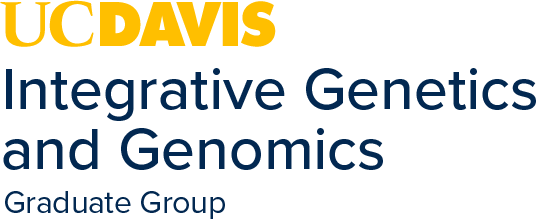About the Program
Students in the Integrative Genetics and Genomics graduate program have the opportunity to apply genomic, molecular, and classical genetic approaches to study model organisms, a broad range of native and agricultural species, humans, and companion animals. Our in-person program integrates genetic research across campus and unites over 120 faculty members from more than 30 departments spanning the College of Biological Sciences, the College of Letters and Science, the College of Agricultural and Environmental Sciences, the School of Medicine, and the School of Veterinary Medicine. Students experience an unsurpassed breadth of research and instructional opportunities from the most fundamental to applied aspects of genetics.
Areas of specialization in the program include:
- Animal genomics
- Chromosome biology
- Computational biology
- Developmental genetics
- Ecological and wildlife genetics
- Epigenomics
- Human genetics and genomics
- Model organism genetics
- Model plants
- Plant breeding
- Quantitative and population genetics
- Synthetic biology
Research
Research in IGG is broad, covering the fields of evolutionary genetics, population and quantitative genetics, conservation genetics, plant and animal genetics (including aspects of plant and animal breeding and more fundamental aspects of plant and animal genetics and genomics), chromosome biology and molecular genetics, and human genetics and genomics. There is a strong emphasis on using bioinformatics techniques to analyze large datasets across research areas, which is a distinguishing feature of our program. This breadth of research is also found in terms of the organisms studied by IGG faculty which range from bacterial communities to many species of plants and animals, to model organisms (E. coli, yeast, C. elegans, Drosophila, A. thaliana, zebrafish), to humans and even viruses. Thus, IGG students are guaranteed a fertile research playground when they choose the program. The breadth of research and the opportunities for collaborative work are viewed as key strengths of the program and incoming students greatly value these attributes. Many students are co-mentored by two PIs to facilitate multidisciplinary collaboration.
Research in IGG labs is highly productive, as judged by 2,921 publications since 2017 by our faculty. This is an average of about 3.2 peer-reviewed publications per faculty per year over the last seven years (range 1 – 36). Many of these publications have appeared in top tier journals including Nature, Science, Cell, PNAS, Nature Genetics, Molecular Cell, Plant Cell, Developmental Cell, PLoS Biology, and eLife. Importantly, collaborations between IGG faculty are frequent. 40% of publications had two or more IGG faculty. Collaborations between IGG labs and other labs on campus, nationally, and internationally are also frequent.
Students
Students come first in IGG. We strive to provide access to the highest level of academic training, research opportunities with nationally recognized faculty members, and state-of-the-art research facilities. We believe that mentorship is an important part of scientific training and places high value on enhancing inclusive excellence. Students who are valued members of our community will generate the most innovative ideas and do the most impactful science.
The median time-to-degree for IGG PhD students is 5.7 years. The median time-to-degree for IGG MS students is 2.5 years.
Beyond research and teaching, IGG students have historically made strong contributions to the life of the graduate group. They serve on every standing committee and regularly hold student executive committees. They make key contributions to Admissions and especially to Recruitment during which they serve as hosts, drivers, organizers, emcees, etc.. Our students are often our best ambassadors. Many of our students take part in community engagement, science education, and outreach to underserved communities, as well as organizing local events such as a Picnic Day with activities for both adults and children. Four IGG students took part in hosting the 2023 International Student Workshop (ISW) held with 53 students and faculty from the Nara Institute of Science and Technology (NAIST) and the Institute of Genetics and Developmental Biology (IGDB) from the Chinese Academy of Sciences in Beijing China and UC Davis students from other graduate groups. The students played an active role as hosts, and all were invited to take part in the 2024 ISW at IGDB in October. IGG is richer from these students’ efforts which we recognize every year at our annual colloquium through awards and prizes.
